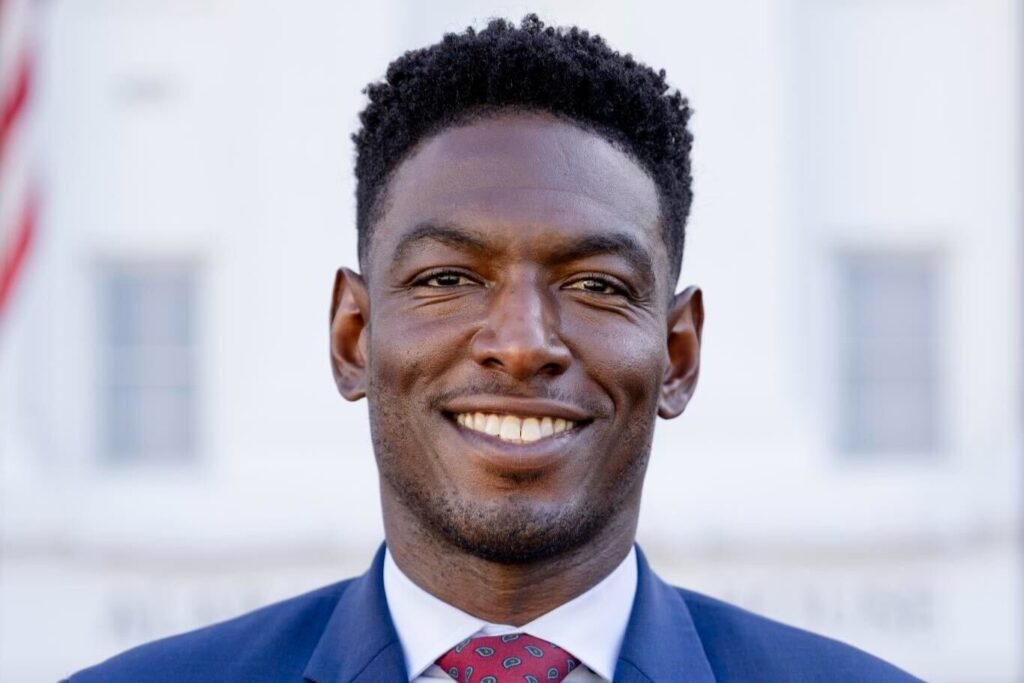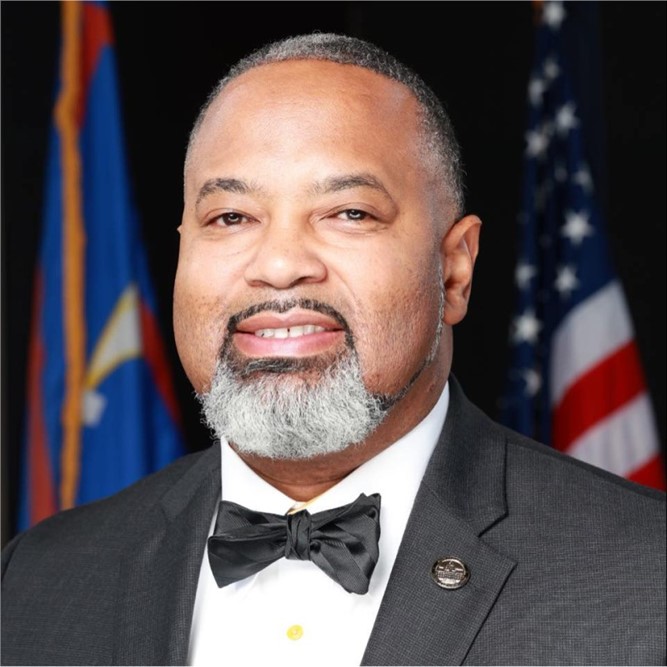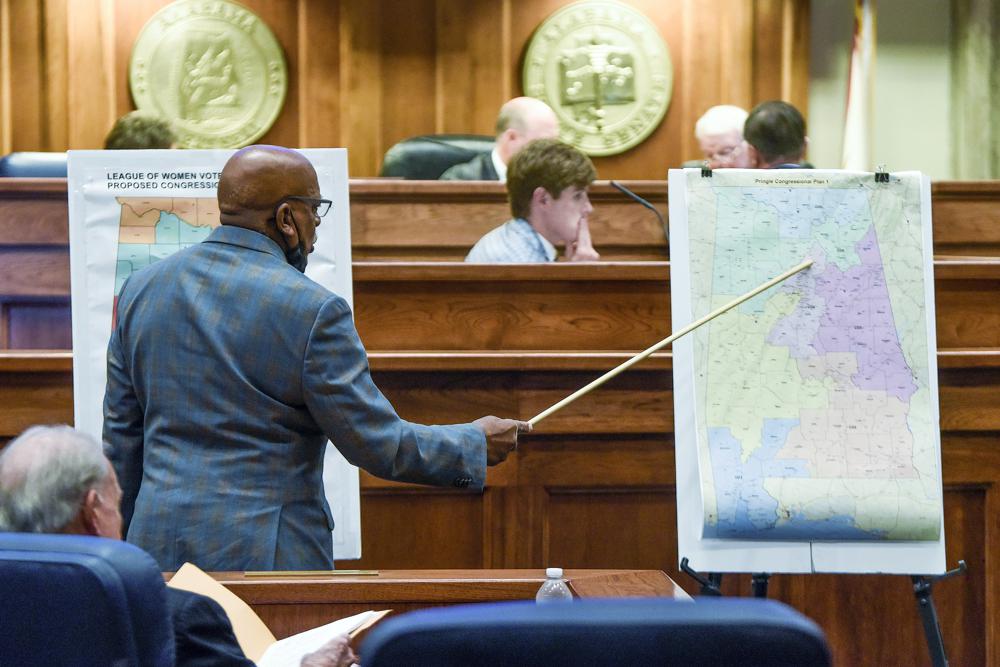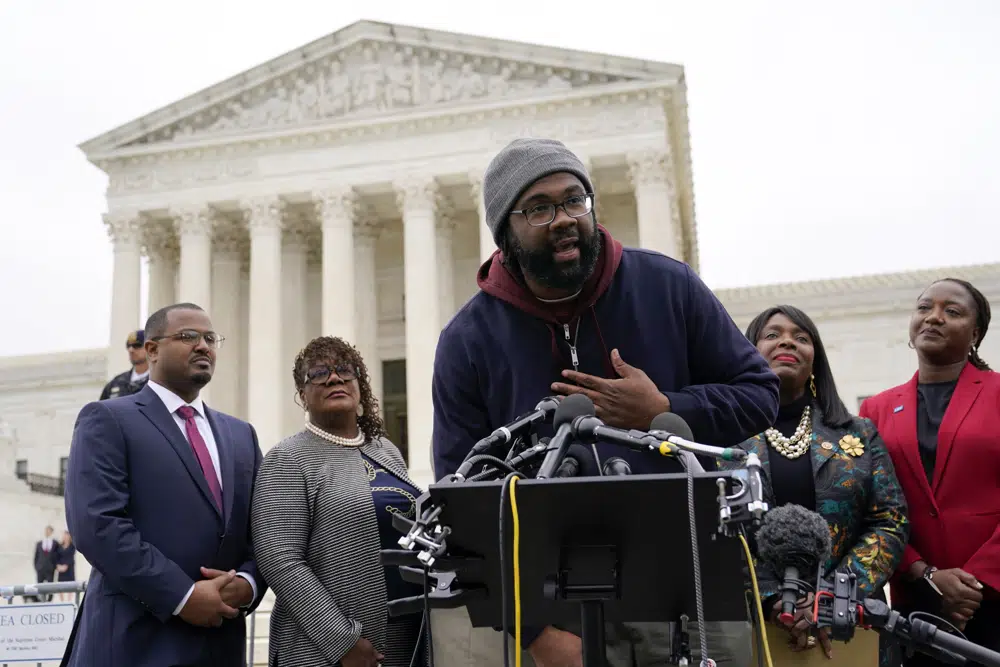Caroleene Dobson qualifies for Congress in Congressional District 2

On Thursday, Montgomery attorney Caroleene Dobson officially qualified with the Republican Party to run for Alabama’s Second Congressional District. Currently, Dobson is the only qualified candidate for the GOP nomination for the newly redrawn CD2. Dobson grew up on a farm in Beatrice. She has a degree from Harvard and a law degree from Baylor University Law School. She practices real estate law. “As a member of Congress, I will fight for our families, our farms, and our faith and preserve the bedrock values and moral backbone that have made our nation the greatest ever known,” Dobson said. “It is time to give Washington, D.C. a good dose of Alabama common sense and go to battle against those on the far left who want to control how we use our property and what we do, think, and say.” Dobson is a member of the Alabama Forestry Commission, the Southeast Livestock Exposition, and the Birmingham Chapter of the Federalist Society. Dobson has promised to protect property rights and free speech rights if she is elected to Congress. Dobson grew up on a cattle farm and excelled in high school rodeo. She was a National Merit finalist and a U.S. Presidential Scholar. She currently practices with Maynard Nexsen in Birmingham. Dobson and her husband, Bobby, have two daughters. State Representative Jeremy Gray (D-Opelika) and Willie Lenard have both qualified to run as Democrats for the seat. Sen. Kirk Hatcher (D-Montgomery), Rep. Napoleon Bracy (D-Prichard), and Jefferson County Commissioner Sheila Tyson have announced that they are running but have not qualified to run yet. Congressman Barry Moore (R-Enterprise) currently represents District 2, but the court-appointed special master drew Moore and his home County (Coffee) out of the Second District and into the First. He is seeking a third term in his new home district against incumbent Congressman Jerry Carl (R-Mobile). The new District 2 spans the state from the Mississippi line to the Georgia line and includes Mobile, Montgomery, Greenville, Troy, Union Springs, Eufaula, and Phenix City, Qualifying for the Republican and Democratic candidates ends on November 10. The major party primaries are on March 5. To connect with the author of this story or to comment, email brandonmreporter@gmail.com.
Rep. Jeremy Gray enters Alabama’s 2nd Congressional District race

Jemma Stephenson, Alabama Reflector Rep. Jeremy Gray, D-Opelika, jumped into the 2nd Congressional District race on Thursday, becoming the third Democratic member of the Legislature to enter the contest. Gray, first elected to the Alabama House of Representatives in 2018, cited issues including reliable housing, childcare, and women’s rights in an announcement on Facebook. “It’s time for a new generation of leadership to bend the arc of justice,” the statement said. “Because the American Dream should be a promise, not a privilege.” In a video accompanying donation requests, Gray also cited his legislation that allowed yoga exercises to be performed in Alabama schools, ending a nearly three-decade-long ban. Gray, a business owner and personal trainer, played college football for North Carolina State University and later played in the Canadian Football League and Arena Football League. A federal court last month approved new congressional maps for the state. The map created a new 2nd Congressional District with a Black Voting Age Population of 48.7%. Due to the racial polarization of Alabama’s voting patterns – where white Alabamians tend to vote Republican and Black Alabamians tend to vote Democratic – the district is seen as a potential pick-up for Democrats. Sen. Kirk Hatcher, D-Montgomery, and Rep. Napoleon Bracy, D-Prichard, have also said they will run for the seat. Democrats Terrell Anderson, Phyllis Harvey-Hall, and Austin Vigue are also running for the seat. Attorney Caroleene Dobson is running on the Republican side. House Minority Leader Anthony Daniels, D-Huntsville, and Sen. Merika Coleman, D-Birmingham, have also said they may enter the race. Former Sen. Dick Brewbaker of Pike Road, a Republican, is also considering a run. The 2nd Congressional District includes Montgomery and the southern Black Belt. Alabama Reflector is part of States Newsroom, a network of news bureaus supported by grants and a coalition of donors as a 501c(3) public charity. Follow Alabama Reflector on Facebook and Twitter.
Napoleon Bracy, Kirk Hatcher enter Democratic race for 2nd congressional district

by Jemma Stephenson, Alabama Reflector Two Democratic state legislators have entered the race for Alabama’s new 2nd Congressional District, and a third said Monday he will decide whether to get in in the next 10 days. Sen. Kirk Hatcher, D-Montgomery, said in an interview Monday that he will run for the seat. The district stretches from the Mississippi border to the Georgia line and includes Montgomery and much of the Black Belt. “We have an opportunity in this district, for these counties represented, to impact a whole host of issues,” said Hatcher. Rep. Napoleon Bracy, D-Prichard, said in a statement Monday he would also run for the new seat. “This is our time, our time to have a seat at the table built on the backs of those who, my entire lifetime, had been disregarded by their Congressional representatives due to their voting record or area code,” the statement said. House Minority Leader Anthony Daniels, D-Huntsville, said in a phone interview Monday he would make a decision about the race before Nov. 9. The new 2nd Congressional District, created by a federal court order at the beginning of October, has a Black Voting Age Population (BVAP) of about 48.7%. With patterns of racial polarization in voting in Alabama, where white Alabamians tend to support Republicans and Black Alabamians tend to support Democrats, the seat is considered a pick-up opportunity for Democrats. U.S. Rep. Terri Sewell, D-Birmingham, is currently the only Democrat in Alabama’s seven-member U.S. House delegation. Hatcher, the director of Project Head Start in Montgomery, said he wanted to be an advocate for additional educational resources and for the military bases within the district. Hatcher also said he wants to get more “equity” when it comes to infrastructure issues. “I’m one of those individuals who’s not going in to upset the apple cart,” he said. “I go in to see what works.” Hatcher was elected to the Alabama House in 2018. He won election to the Alabama Senate in 2021 and was re-elected in 2021. Alabama Political Reporter first reported Hatcher’s candidacy. Hatcher said Monday he had the support of Montgomery Mayor Steven Reed, who had been seen as a top candidate for the race. Reed told Al.com’s Mike Cason earlier this month that he was considering a run. Adam Muhlendorf, a spokesman for Reed, said Monday the mayor had no comment on his congressional plans. Bracy, a member of the Alabama House since 2010, touted his legislative leadership, including his prior service as chair of the Alabama Legislative Black Caucus in 2013. “At the heart of progress is education, healthcare, economics, and workforce development,” Bracy’s statement said. “And in communities where poverty is still real and economic development is scarce, we have watched the world grow around us while feeling the strain of disinvestment with no one to stand in the gap.” Bracy did not provide further comment beyond the statement. Daniels, who has touted his connections with Bullock County, said he had a track record of delivering programs around the state, including a bill passed in the Republican-controlled Legislature this spring to exempt overtime pay from income tax. He also cited work on behalf of Democratic candidates around the state. “What have you done to make an impact? That’s what voters want to know,” he said. Other figures may jump into the race. Sen. Merika Coleman, D-Pleasant Grove, said Monday that she was still exploring a candidacy, but she had not decided. She has filed with the FEC due to technicalities around her exploratory committee. Former Sen. Dick Brewbaker, R-Pike Road, said Monday he is still considering a run in the district. U.S. Rep Barry Moore’s chief of staff confirmed to Al.com’s John Sharp that he would be running in the new 1st Congressional District, setting up a primary battle with current U.S. Rep. Jerry Carl, R-Mobile. The new map drew Moore, currently the U.S. representative for the 2nd Congressional District, into the 1st Congressional District. Brewbaker said that Moore’s decision “clears the way for me to run in the 2nd.” “But until I qualify, I don’t want to make an official announcement because you never know what God has for a person,” he said. One other candidate confirmed their candidacy Monday. Phyllis Harvey-Hall said in a phone interview Monday that she is running to be the “people’s candidate” and pointed to her previous runs in the district. Hall’s concerns included women’s healthcare and autonomy, as well as hospitals in rural areas. “So I’m running to be a people’s candidate, the voice and someone that’s going to fight for the things that we need today,” she said. Federal Election Commission filings also show that Harvey-Hall filed on Oct. 18, Terrell Anderson filed in April, and Austin Vigue filed in 2022. The Democratic primary for the seat will take place in March. Editor Brian Lyman contributed to this report. Alabama Reflector is part of States Newsroom, a network of news bureaus supported by grants and a coalition of donors as a 501c(3) public charity. Alabama Reflector maintains editorial independence.Follow Alabama Reflector on Facebook and Twitter.
Napoleon Bracy announces campaign for U.S. Congress in newly redrawn District 2

Today, Napoleon Bracy announced his campaign for Congress to represent District 2. District 2 was recently redrawn after the U.S. Supreme Court issued a decision in Allen v. Milligan that said Alabama’s previously-drawn map violated the Voting Rights Act and ordered new maps that create an “opportunity district” for minority voters to cast ballots for the candidates of their choice. Bracy has been a member of the Alabama House of Representatives, representing District 98, since 2010. He was elected to serve as chairman of the Alabama Legislative Black Caucus in 2013 and is currently the co-chairman of the Mobile County Legislative Delegation. Bracy posted on Facebook, “I’ve been praying and now I’m about to step out on faith. Please pray for me and our community and please like and share to show your support.” Almost 30 percent of the state’s population is African American, but only one of the state’s seven congressional districts has a Black representative: Congresswoman Terri Sewell, who represents District 7. “We are taking this thing to Congress,” Bracy said. “This district is made up of so many cities, communities, and neighborhoods just like the one I grew up in—places hurting with high poverty and crime rates, unemployment that just don’t have a lot of opportunities, some of it is because they’ve been overlooked. This gives us an opportunity to finally have a seat at the table and get the things we deserve.” Bracy graduated from Blount High School in 1995 and is a 2000 graduate of Dillard University of New Orleans. He received his Honorary Doctor of Divinity Degree from Pentecostal Bible College of Tuskegee, Alabama, in 2014. Bracy is the manager of diversity and inclusion for Austal USA, a defense contractor for the U.S. Department of Defense. He began his political career at age 26, in 2004, with the Prichard City Council, representing District 3.
Federal court hearing on redistricting case set for today

The entire political world in Alabama will be watching Monday to see what the court does with Alabama’s disputed redistricting case. A hearing is scheduled for Monday, August 14, in federal court at 9:00 a.m. CDT at the Hugo L. Black United States Courthouse in Birmingham. The hearing will focus on whether the map recently passed by the Alabama State Legislature complies with section two of the Voting Rights Act of 1965. Civil rights groups sued the state challenging the redistricting map that the Legislature passed in 2021. A three-judge panel of the Eleventh Circuit Court of Appeals in Atlanta ordered a halt to the 2022 election over concerns the map violated the 58-year-old Voting Rights Act. The U.S. Supreme Court intervened at the request of the state and allowed the election to proceed with the 2021 map. In June, the Supreme Court ruled in a 5 to 4 ruling that the congressional map likely violated the VRA and referred the case back to the three-judge panel. The Legislature was given until July 21 to submit a new map. The parties that sued the state and Alabama Democrats had wanted the Legislature to submit a map with two majority-minority districts. The Legislature, voting along party lines, refused and instead introduced and passed a controversial new map that simply increased Alabama’s Second Congressional District from 30% Black to 39.9%. That map kept the Gulf Coast, the Wiregrass, and Montgomery County whole; but was denounced by Democrats. The civil rights groups suing the state in federal court in Allen versus Milligan are asking the court to reject this new map. Members of the Alabama House Democratic Caucus, including House Minority Leader Anthony Daniels (D-Huntsville), will be outside the courtroom on Monday to issue their response following the conclusion of Monday’s hearing. Joining Daniels will be Caucus Chair Barbara Drummond (Mobile), Caucus Policy Chair Adline Clarke (Mobile), Caucus Secretary/ Treasurer Kelvin Lawrence (Hayneville), Rep. Patrice McClammy (Montgomery), Rep. Phillip Ensler (Montgomery), Rep. Chris England (Tuscaloosa), Rep. Patrick Sellers (Birmingham), Rep. Rolanda Hollis (Birmingham), Rep. Curtis Travis (Tuscaloosa), Rep. Napoleon Bracy (Mobile), Rep. Tashina Morris (Montgomery), Rep. A.J. McCampbell (Demopolis), and Rep. Sam Jones (Mobile) to comment on the court proceeding. “As we gather for the August 14th federal court hearing in Birmingham, Alabama, surrounded by the hallowed sites of the Civil Rights movement, we are reminded that this moment is inseparable from that struggle,” Daniels said. “We hope and pray that this court hearing, this next step, is a step forward on a continued path towards fair representation for all.” The Alabama House Democratic Caucus endorsed a redistricting plan, proposed by the Milligan and Caster plaintiffs, that would have created two majority Black congressional districts while respecting traditional redistricting guidelines. That map was rejected by the Republican supermajority and largely excluded from consideration during the legislative process. The major party primaries are on March 5, with candidate qualifying opening on October 16, so knowing where the congressional district lines are for that pending election is of some importance. To connect with the author of this story or to comment, email brandonmreporter@gmail.com.
Democratic leadership address the Supreme Court rejection of Alabama’s congressional redistricting

On Thursday, the United States Supreme Court ruled that Alabama must redraw the state’s congressional map to allow an additional Black majority district to account for the fact that the state is 27% Black. The Alabama House Democratic Caucus and the Alabama Legislative Black Caucus both applauded the ruling. Alabama House Minority Leader Anthony Daniels (D-Huntsville) said, “During a severely short and limited map-drawing process, our Caucus spoke at length about our view of the law and provided ways the state could craft at least two districts that reflect fair political opportunities for African American voters.” “We are therefore pleased that the Supreme Court affirmed the decision of the unanimous district court, which found the Alabama maps were discriminatory,” Daniels continued. “We stand ready to participate meaningfully with our colleagues to create a new map that fully complies with the law.” Rep. Terri Sewell wrote on Twitter, “Wow!!! The Supreme Court just upheld Section 2 of Voting Rights Act of 1965 and protected the voices of Black and minority voters. This is a historic victory not only for Black voters in Alabama, but for Democracy itself.” In a press release, Sewell said, “This is a historic victory, not only for Black voters in Alabama, but for Democracy itself. With this decision, the Supreme Court is saying loudly and clearly that the voices of minority voters matter and that fair representation must be upheld. I know that John Lewis and the Foot Soldiers of the Voting Rights Movement are smiling as they look down on us. Today, their sacrifice was rewarded. Our work is not over. We must continue the fight for fair representation by passing the John R. Lewis Voting Rights Advancement Act to restore the full protections of the Voting Rights Act of 1965.” State Senator Merika Coleman (D-Birmingham) is the Chair of the Alabama Legislative Black Caucus. “From the beginning of this case, we have strongly denounced racial gerrymandering and will continue our efforts to ensure that districts are drawn equitably and fairly,” said Sen. Coleman. “I applaud Chief Justice (John) Roberts for preserving Section 2 of the Voting Rights Act. This is a major victory for Black voters in Alabama, as well as the entire nation.” State Representative Napoleon Bracy, Jr. (D-Prichard) is the Vice Chair of the Alabama Black Legislative Caucus. “In a resounding victory for fair representation, the Supreme Court’s unexpected decision stands as a powerful testament to the importance of upholding the Voting Rights Act,” Rep. Bracy said. “By prohibiting racial gerrymandering in Alabama, the Court reaffirms the principle that every citizen’s voice deserves to be heard, regardless of their race. This ruling sends a clear message that political power should not be diluted through discriminatory practices, ensuring that the spirit of democracy remains strong and inclusive in Alabama.” In 2021, the Alabama state legislature produced new congressional maps which closely paralleled the previous 2012 redistricting with just one Black majority district. In a narrow 5-4 decision, the majority of the Court sided with the plaintiffs and affirmed that Section 2 of the Voting Rights Act requires the Alabama legislature to draw a second district where minority voters can elect a candidate of their choice. The decision will also have an impact across the South, as today’s decision clears the way for additional minority districts to be drawn in other states with challenged maps, like Georgia and Louisiana. “It is hard to imagine many more fundamental ‘prerequisites’ to voting than determining where to cast your ballot or who you are eligible to vote for,” Chief Justice John Roberts wrote. The 34-page decision in Milligan penned by Roberts recommits to the Voting Rights Act’s promise as the foundation for justice for all, not just some. Roberts was joined by Justices Sonia Sotomayor, Elena Kagan, Kentaji Brown Jackson, and Brett Kavanaugh. Jeff Loperfido is the Interim Chief Counsel for Voting Rights at the Southern Coalition for Social Justice. “This is a great day for democracy and for the voting rights of Black and Brown communities throughout the South who continue to be the targets of discriminatory laws that seek to silence their voices and stifle their growing political power,” said Loperfido. “The Court’s forceful repudiation of Alabama’s extreme and disingenuous ‘race-blind’ mapping theory is a testament to the important role the Voting Rights Act plays in rooting out discriminatory electoral practices.” The Legal Defense Fund (LDF), American Civil Liberties Union, ACLU of Alabama, Hogan Lovells LLP, and Wiggins, Childs, Pantazis, Fisher & Goldfarb brought the case in November 2021 on behalf of Evan Milligan, Khadidah Stone, Letetia Jackson, Shalela Dowdy, Greater Birmingham Ministries, and the Alabama State Conference of the NAACP. It was argued before the Court on Oct. 4, 2022. The case goes back to the three-judge panel of the Eleventh Circuit Court of Appeals in Atlanta that originally ruled against the State of Alabama. The Supreme Court had stayed its ruling last year at the request of Alabama Governor Kay Ivey, Alabama Attorney General Steve Marshall, and then-Secretary of State John Merrill. The three-judge panel will decide whether to order the Legislature to redraw the districts following the orders of the Court or order the state to adopt a zoning map drawn by the courts. Two alternative maps were presented to the Court by the plaintiffs. The easiest thing would be for the three judges to order the state to accept one of those maps. Whatever happens, Alabama’s Congressional maps will look substantially different than they are today by the end of the year. This will likely impact hundreds of thousands of Alabama voters. The major party primaries for the congressional districts will be on March 6. To connect with the author of this story or to comment, email brandonmreporter@gmail.com.
House passes legislation making it illegal for persons under 21 to possess or purchase vape products

On Tuesday, May 16, the Alabama House of Representatives passed legislation to prevent children from being able to buy vape products. The bill bans the sale of vapes to anyone under 21. It also established the Alcohol Beverage Control Board as the agency tasked with enforcing these regulations. House Bill 319 (HB319) is sponsored by State Representative Barbara Drummond. “This is another bite at the vaping apple,” Drummond said. “The purpose of this bill is to protect young people under 21 from vaping,” Drummond said. “This makes it illegal to purchase, possess, or transport any vaping products.” HB319 expands the definition of electronic nicotine delivery systems to include vape products that do not contain nicotine. Drummond explained that her previous legislation was difficult to enforce. “We will now have an opportunity for ABC to help,” Drummond said. “I have gotten 1200 vaping violations this year.” “There will be consequences for those kids that are continually vaping in our communities,” Drummond added. Drummond asked that the body adopt the substitute version of the bill prepared by the House Judiciary Committee. Rep. A.J. McCampbell (D-Livingston) said, “I am glad to know that we are going to have something out there, and I look forward to voting for it.” “Our children are exposed to a lot of things that frankly they should not be exposed to,” McCampbell said. Drummond said, “This is for the health of our young people.” “We did not have the enforcement,” in my previous bill Drummond said. Under existing law, there is no fee for a permit to distribute tobacco, tobacco products, electronic nicotine delivery systems, e-liquids, or alternative nicotine products. This bill would require a one-time application fee and an annual permit fee for the distribution of those products and would provide for the distribution of those fees. “We do not get any money from this industry now,” Drummond explained. “I have worked with more groups on this piece of legislation.” Drummond said, “I am only concerned with young people 21 years and younger.” McCampbell said, “You have evolved from one level of understanding and moved to another level of understanding on this topic.” Rep. Mark Shirey said, “We are going to have some long-term health problems from vaping.” Drummond explained that the bill creates “a graduated penalty process for those young people who vape and who continue to vape, especially on school campuses.” The House voted to adopt the committee substitute. Rep. David Faulkner brought an amendment to the bill as substituted. “It has how the fees should be collected and how the fees should be distributed,” explained Faulkner. “On the punishment on sellers, it makes this penalty a ‘shall’ so they will receive that punishment. It is not an issue of ‘may.’” Drummond said. “I think this will be a great amendment, and I appreciate you working with me.” Rep. Napoleon Bracy asked, “Can you tell me a little about the penalties? The penalties are enforced by the ABC Board?” “Yes, that is correct,” Faulkner said. “It is a graduated penalty. So on a first violation, a $500 fine, or subsequent $700, then $1000. Eventually, you will lose your permit.” The amendment was adopted on a vote of 101 to 0. Rep. Curtis Travis said, “It is a major problem for school systems. Thank you for bringing this bill.” Rep. Ron Bolton said, “I want to thank you for bringing this bill and the bipartisan way that you worked on it.” HB319 passed the Alabama House of Representatives 100 to 1. It now goes to the Senate for their consideration. Vape industry representatives have contacted Alabama Today and expressed their unhappiness with the definitions in the bill. Additionally, they insist that their products are far safer than smoking and that further cracking down on vape products in Alabama will only lead to products being brought across state lines. HB319 has been referred to the Senate Judiciary Committee, which meets next on Wednesday at 8:30 a.m. in Room 325 of the Statehouse. The committee agenda has not been posted as of press time. Tuesday will be day 24 of the 2023 Alabama Regular Legislative Session. To connect with the author of this story or to comment, email brandonmreporter@gmail.com.
Alabama House votes to advance state cookie legislation

On Tuesday, the Alabama House of Representatives voted to pass legislation establishing the yellowhammer cookie as the official state cookie. House Bill 421 (HB421) is sponsored by State Representative Reed Ingram. Reed explained that legislation making the “Yellowhammer Cookie” the official state-designated cookie was brought to him by the Fourth graders at Trinity Presbyterian School in Montgomery. Katherine Bandy is a counselor at Trinity. “We are learning about state symbols and Alabama history,” Bandy said. “And we figured out that Alabama doesn’t have a state cookie.” Reed explained that the students resolved to fix this situation by holding a cookie contest. The fourth graders submitted cookies, and the seniors judged them. Ultimately the Yellowhammer Cookie was judged the best cookie to submit to the legislature. “We needed a state cookie,” Bandy said. Mary Claire Cook developed the winning recipe. Alabama Today asked Cook if making the cookie was something an ordinary person could do or if it required a factory to produce. “Anyone can make it,” Cook assured. “I make it myself.” The Yellowhammer Cookie contains oats and pecans and has a peanut butter filling. Bandy explained that those three ingredients are essential because they are grown here in Alabama by Alabama farmers. The pecan is already the official nut of Alabama, and the peanut is the official legume of the state of Alabama. Cook explained that she began this project with her grandmother. They looked up recipes and began substituting in Alabama ingredients before arriving at the Yellowhammer Cookie. The Yellowhammer Cookie was chosen over two dozen other submissions. The fourth graders from Trinity were on hand at the House gallery to watch the bill be debated on the Alabama House of Representatives floor. Ingram explained that the last state symbol passed by the legislature was the decision to make the sweet potato the official state vegetable. Speaker of the House Nathaniel Ledbetter recognized the fourth graders for their involvement in the legislative process. At Ledbetter’s request, the whole body gave them a round of applause in recognition of their work. State Rep. A.J McCampbell told Ingram, “Usually when you have a bill, I have got to scrutinize it. The only problem I have with this bill is that you are asking us to designate this the state cookie, and I have not had one. I need a cookie. Where’s my cookie?” Ingram said, “I think they can arrange that.” Rep. Danny Garrett told Ingram, “One thing I have learned about you other than you are a great legislator and a great man is that you know cookies.” Rep. Napoleon Bracy said, “I got into politics when I ran for president of the SGA.” “Students learn Alabama history in the fourth grade,” Bracy explained. Ingram said, “We had a big shout-out to George Washington Carver for his work with the peanut.” Ingram explained that the Yellowhammer Cookie “is kind of like an oatmeal cookie with peanut butter in the middle.” “Is this something that we can mass produce? Have we trademarked this?” Bracy said. “This is something they can talk about on Shark Tank.” “This is something great for these students,” Bracy said. “It is uncontroversial. A lot of times, the first two bills on the calendar are kind of divisive.” Rep. Mary Moore said, “I want to thank you for paying attention to young people. I appreciate you for highlighting Dr. Carver and his work.” Speaker Ledbetter thanked former Congresswoman Martha Roby for helping the children navigate the legislative process with their bill. HB421 was passed 103 to 0. It now goes to the Alabama Senate for their consideration. Ingram told Alabama Today that he thinks Senator Will Barfoot will carry the bill in the Senate. The Art of Alabama Politics Facebook page shared the recipe. Wednesday will be day 22 of the 2023 Alabama Regular Legislative Session. To connect with the author of this story or to comment, email brandonmreporter@gmail.com.
Bill to prevent China from buying Alabama real estate passes House

On Tuesday, the Alabama House of Representatives passed legislation that would forbid Chinese citizens, Chinese businesses and corporations, and the Chinese Communist Party and government from being able to purchase land and other real property in the state of Alabama. House Bill 379 (HB379) is sponsored by House Majority Leader Scott Stadthagen. Stadthagen said, “They are the biggest threat to us.” The synopsis states, “Under existing law, an alien, whether resident or nonresident, may own, hold, or dispose of real property with the same rights as a native citizen. This bill would prohibit Chinese citizens, the Chinese government, or Chinese entities from acquiring title to real property in the state.” State Representative Mary Moore said they were not a problem until Ronald Reagan. “When President Reagan started encouraging our companies to go overseas,” Moore said. “That accounts for a lot of poverty, especially in southern Alabama and eastern Alabama because they were clothing manufacturers.” “The problem is bigger than the state of Alabama,” Moore said. “President Reagan loved China, and they became a superpower.” Stadthagen explained that if his bill passes, “They can’t purchase property in Alabama.” Rep. Jamie Kiel said, “Your bill protects the state from the communist Chinese.” “My district was also impacted by the great sucking sound of jobs leaving the country that Ross Perot talked about, and that was under President [Bill] Clinton in 1994 with NAFTA,” Kiel said. “President [Barack] Obama said that the relationship between the U.S. and China was the most important bilateral relationship in the world.” “Whoever started it, it is time to stop it, and I appreciate the bill,” Kiel said. Rep. Tracy Estes said, “For those who may think that the Chinese are not the greatest threat to this country, don’t be fooled.” Rep. Napoleon Bracy asked, “What prompted this?” Stadthagen explained, “In the last year, the Chinese have purchased over six billion dollars’ worth of property.” “This is a protection bill,” Stadthagen said. “I know of several real estate contracts that are in progress.” Bracy asked, “What if they are already here?” “Then they are already here,” Stadthagen answered. “What if they wanted to expand?” Bracy asked. “Then they have to get a citizen or a dual citizen to purchase that property, and they can lease it from them,” Stadthagen answered. Bracy asked, “Could this hurt the economy?” Stadthagen said that it had not in the other states that have done this, but admitted, “This is something that is fairly new.” Stadthagen said, “The Department of Commerce wants to talk to me about it before it goes upstairs to the Senate.” Bracy said that a Chinese corporation had bought piston engine manufacturer Continental Motors. “Continental is in Mobile,” Bracy said. “Are they the enemy? They are providing jobs to our citizens. They are providing over 300 jobs.” “If Continental Motors decides to leave and those 300 jobs and their $75 million investment leaves with them, then we are impacting a lot more people than what this was designed to impact,” Bracy said. Rep. Tim Wadsworth expressed concerns that the way this was written would also apply to Taiwan. “Taiwan is not a part of it,” Stadthagen said. “About 90% of the semiconductor chips in this country are made in Taiwan,” Wadsworth said. “China and the U.S. actually consider Taiwan to be one country as part of the one-China policy.” Rep. Sam Jones said, “Continental Motors was a U.S. Company that sold out to China. They have been in Mobile for over 50 years.” Jones said he had been on several international job recruiting trips as the Mayor of Mobile. “We weren’t recruiting politics – we were recruiting jobs and companies,” Jones said. “Do I support the communism in China? No, I don’t, but we are a world economy.” Stadthagen said, “Do you know how many acres of land are owned by other countries? 1.4 million acres in Alabama are owned by foreign countries.” Jones said, “Alabama exports surged to over $25 billion last year. Our two largest trading partners are Germany and China.” “We don’t handle foreign policy,” Jones said. “That is not what we do here. You don’t know the facts because you have never spent any time recruiting industries.” “We watch Florida and pass everything that they do down there,” Jones said. “I am surprised that we have not passed anything about Mickey Mouse yet. We follow Florida, but we aren’t Florida.” Rep. Neil Rafferty asked about Chinese people that have moved here seeking asylum. “They can lease a house or property while they work on their citizenship,” Stadthagen answered. Rafferty asked, “Why don’t we do this for Vietnam or Laos? They are communist.” “They are not a threat to us,” Stadthagen answered. Rafferty asked, “What other countries would you do this with? “North Korea and Iran,” Stadthagen answered. Rep. John Rogers said, “The federal government is the one who ought to be pulling the trigger on China.” “If China were to stop exporting all the stuff they make for us, we would be in a world of hurt,” Rogers said. “This concerns me because it seems to single out one particular race. I like Chinese food.” Rogers asked, “If China called in our debt, can we pay it?” Stadthagen answered, “We can’t.” Rogers said, “Can you imagine if we had a war with China? We will have to draft you.” Rep. Barbara Drummond said, “I am here standing for Mobile. Brookley is in my district, so I have seen this business grow. I have seen Brookley take off. They are contributing to our local economy. They are contributing to the Alabama economy. I know China is a communist country, and I know how they treat women, and I don’t like that.” Drummond said, “Our Chamber has red-flagged this for us and said that this is going to hurt.” Rep. Ben Robbins offered an amendment addressing members’ concerns. The amendment exempted companies already operating in the state and Taiwan from the legislation. Stadthagen accepted the amendment as friendly, and it was adopted in a 100 to 0 vote. SB379 passed the House in a
Alabama House passes bipartisan $45 million in tax cuts bill

On Tuesday, the Alabama House of Representatives voted to pass legislation eliminating all state income taxes on workers getting paid overtime. The sponsor estimates this amount to be a $40 million income tax cut for hourly workers. House Bill 217 (HB217) is sponsored by House Minority Leader Anthony Daniels. “This will put money back into the local economy because those workers will spend that money in their local areas,” Daniels explained. “This helps the hourly workers.” Daniels was asked what states have this. “This is a new idea that has never been tested, which is why we have a three-year sunset in case we need to go back and look at this,” Daniels said. “A lot of employers say that their employers will not work overtime because of the tax hit that they receive. This will allow companies to increased production with a smaller workforce.” Rep. Barbara Drummond said, “You have created a box that no one else has. I applaud you for bringing this bill.” Rep. Danny Garrett said, “The three-year sunset is so that we have an opportunity to evaluate it.” “I think this gets our labor force participation and productivity up,” Garrett said. Rep. Napoleon Bracy said, “In my day job, I have a responsibility to hire 1,200 people in the next three years. It is very hard to find them. The craft workers at our facility work Monday through Thursday ten hours a day. They are off Friday, Saturday, and Sunday. It is real hard to get them to come in on their off days because the tax burden is so heavy on them.” “The hospitals are real excited about this,” Bracy added. “This lets us get more from the workers that we already have.” State Rep. John Rogers asked, “How much is this going to cost the employer?” Daniels said, “This will cost the employer nothing. For the employee, they will see less money taken from their checks.” Rogers asked, “This will help us with corrections officers?” Daniels said, “This will encourage them to work longer hours because they get to keep more of that money.” House Majority Leader Scott Stadthagen said, “This is what we are down here for to make a difference.” “From what I am hearing along the borders, they are losing workers to other states,” Daniels said. “This will help with that.” The House voted to adopt the committee sub. State Rep. Paul Lee asked, “What does an employer have to do?” Daniels answered, “They just don’t collect the tax after the first forty hours. There are no fines or fees with this.” “This will not go into effect this calendar year,” Daniels explained. “This will go into effect in the next calendar year.” “The cost will be about $45 million,” Daniels estimated. The lost revenue will come from the education trust fund (ETF) budget. “The local economy will benefit more from this than the state,” Daniels said. What workers would have paid in income taxes will be spent at local stores and businesses, so that will bring in $1.8 million in additional sales taxes.” Lee said, “This is a very good Republican bill, and I appreciate you bringing it.” HB217 passed the House of Representatives 105 to 0. 100 members signed on as cosponsors of this legislation. This legislation will now go to the Senate for their consideration. Wednesday will be day 17 of the 2023 Alabama Regular Legislative Session. To connect with the author of this story or to comment, email brandonmreporter@gmail.com.
Alabama House passes bill to make it a crime to chemically endanger a first responder

Fentanyl has been a deadly scourge in the state killing thousands of drug users. It has also become dangerous for first responders who have to deal with drug dealers and drug users who are suffering from drug overdoses. House Bill 230 (HB230) is sponsored by State Representative Matt Simpson (R-Daphne). “This bill would create the offense of a criminal endangerment of a first responder,” Rep. Simpson explained, “With escalating penalties depending on the degree of the injuries to the first responder.” “If he knowingly, negligently, or intentionally injures a first responder with a scheduled one controlled substance,” Simpson said. “If it is just physical injury, it is a Class C felony. If it is a serious physical injury, it is a Class B felony. To cause the death of a first responder would be a Class A felony.” Of the four classes of felonies in Alabama – A, B, C, D – A is the most serious and typically carries the largest penalties. “Why did you not have this in your previous bill,” raising the penalties for fentanyl traffickers Rep. Juandalynn Givan asked. “I did not want to muddy the water with that bill,” Simpson explained. “Researching that bill, I talked with officers who had been injured in the line of duty from exposure (to drugs).” “It is not just being around it,” Simpson said. For the crime of chemical endangerment of a first responder, the injury must be caused by “ingestion, inhalation, or contact” with the controlled substance. Rep. Napoleon Bracy asked Simpson why he did not address this in the previous bill. “I did not want to add something on it,” Simpson explained. “I wanted that to get through clean. This came up while I was working on it. I heard so many stories from officers who had been injured. They have to get Narcan hit. They have to go to the emergency room. There have been serious injuries.” Bracy said, “You can have a crime scene that spills over into other areas.” Bracy, whose wife is in the medical field, wanted emergency room doctors and nurses who may be exposed to dangerous narcotics while tending to narco-traffickers also included in the definition of “first responders” in this bill. “I think we are missing a group of people that need to be included in this,” Bracy said. “They (the drug dealer/users) are either going to a hospital, a psychiatric facility, or a county jail. I think we need to include them.” Simpson said after some discussion with Bracy and staff, “They are included. The medical teams at the hospital would be included.” Rep. Laura Hall brought an amendment to the bill adding in some language to the bill. Simpson said that the Hall amendment was a friendly amendment. The Hall amendment was adopted in a 105 to 0 vote. The House of Representatives passed HB230 as amended on a 105 to 0 vote. The legislation now goes to the Alabama Senate for their consideration. Wednesday will be day 17 of the 2023 Alabama Regular Legislative Session. To connect with the author of this story or to comment, email brandonmreporter@gmail.com.
State employees set to receive two percent raise

On Tuesday, the Alabama House of Representatives passed the state general fund budget (SGF). As part of that package, the House passed legislation giving state employees a two percent across-the-board pay increase. House Bill 154 (HB154) was sponsored by State Representative Napoleon Bracy Jr. The legislation provides for a two percent cost of living wage increase for Alabama state employees. Rep. Bracy said, “Given the increased cost of certain products and services due to the pandemic and inflation, I felt this was the right thing to do for our hard-working state employees and their families. In fact, after spending more than two decades below 3%, the consumer price index (CPI)—a key measure of U.S. inflation—nearly tripled from 2020 to 2021, rising from 1.4% to 7.0%. This will certainly help offset those increased costs for our dedicated state employees who serve the people of Alabama.” This is the largest SGF budget in state history. The House version was $3,024,167,948 – over $15,000,000 more than Governor Kay Ivey requested and over $169 million more than the 2023 budget. The cost of the COLA to the budget is estimated at $14 million. HB154 and all the budget bills had support from the whole body: Democrats and Republicans. Rep. Rex Reynolds is the Chairman of the House Ways and Means General Fund Committee that prepares the SGF budget in the House of Representatives. “I’ll tell you that the Speaker set up an environment for the budget to be successful, and that was a joint caucus briefing, and that really brought all the Democrats in to sit with the Republicans,” Reynolds said in a video statement. “I had a lot of dialogue about the budget, and it made a difference. You see that. And there was a lot, particularly with the new members, they had dialogue, starting all the way back in January.” Rep. Nathaniel Ledbetter is the Speaker of the House. “Chairman Reynolds did an excellent job, and the committee really worked hard to make sure that they put all the pieces together,” Ledbetter said. Reynolds, “Had a lot of conversations with a lot of members – and that is the way that it should be – and it is very transparent what he did. This is his first one – the first one he got out – and it was in record time with a unanimous vote.” “We’re strong right now,” Reynolds said. “We have got extra monies, and we’re putting that money back into services and in direct grants to our communities. I call that accomplishment spending, and I think that played out in what you heard on the floor yesterday.” The cost-of-living adjustment (COLA), if approved by the Senate and signed by Governor Kay Ivey, will go into effect at the start of FY2024 fiscal year on October 1. Alabama has an arcane budgeting system with most of the money earmarked and two budgets: the SGF and the education trust fund (ETF). The bill, along with the rest of the budget package, has now been sent to the Alabama Senate for its consideration. To connect with the author of this story or to comment, email brandonmreporter@gmail.com.

